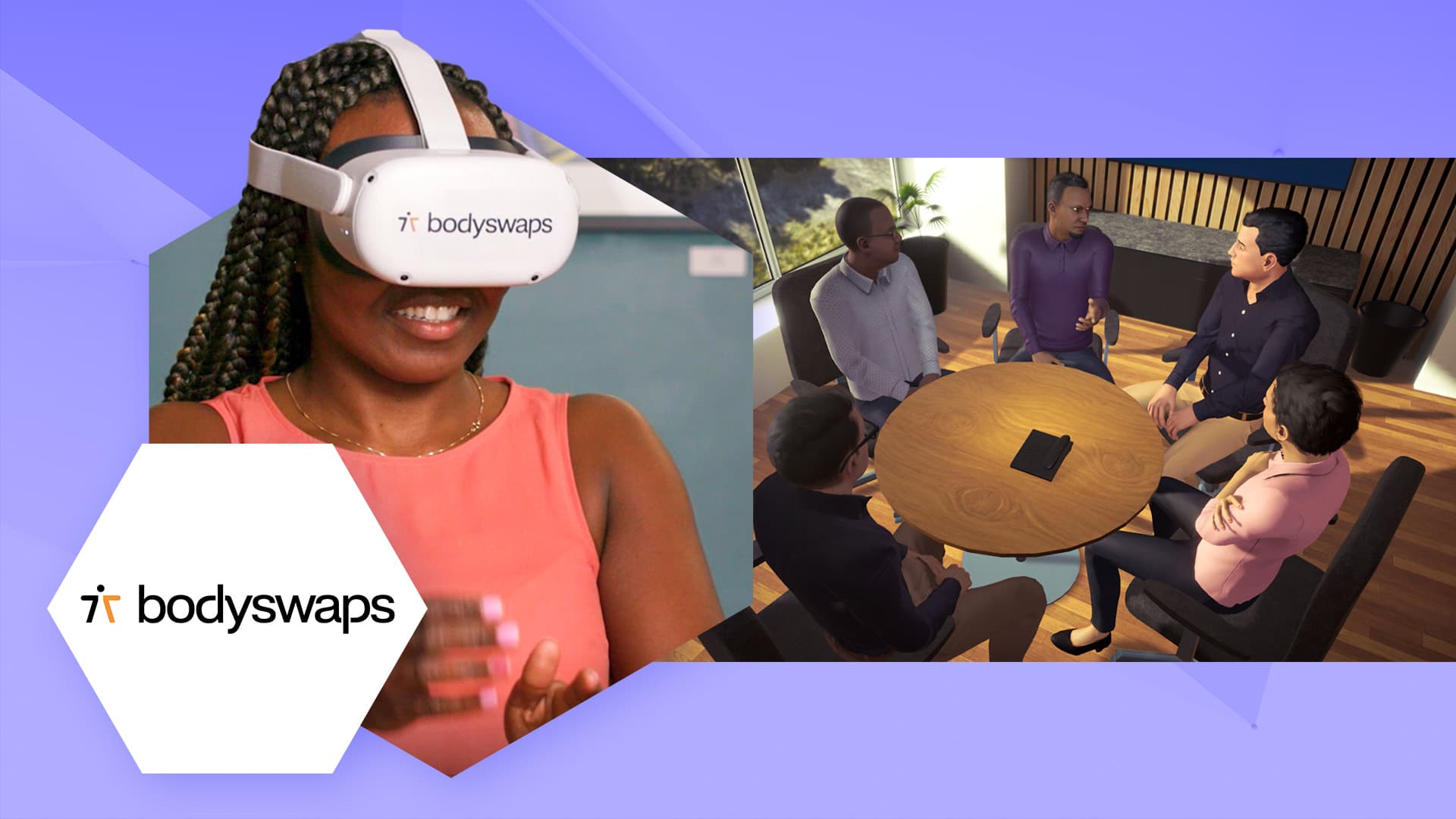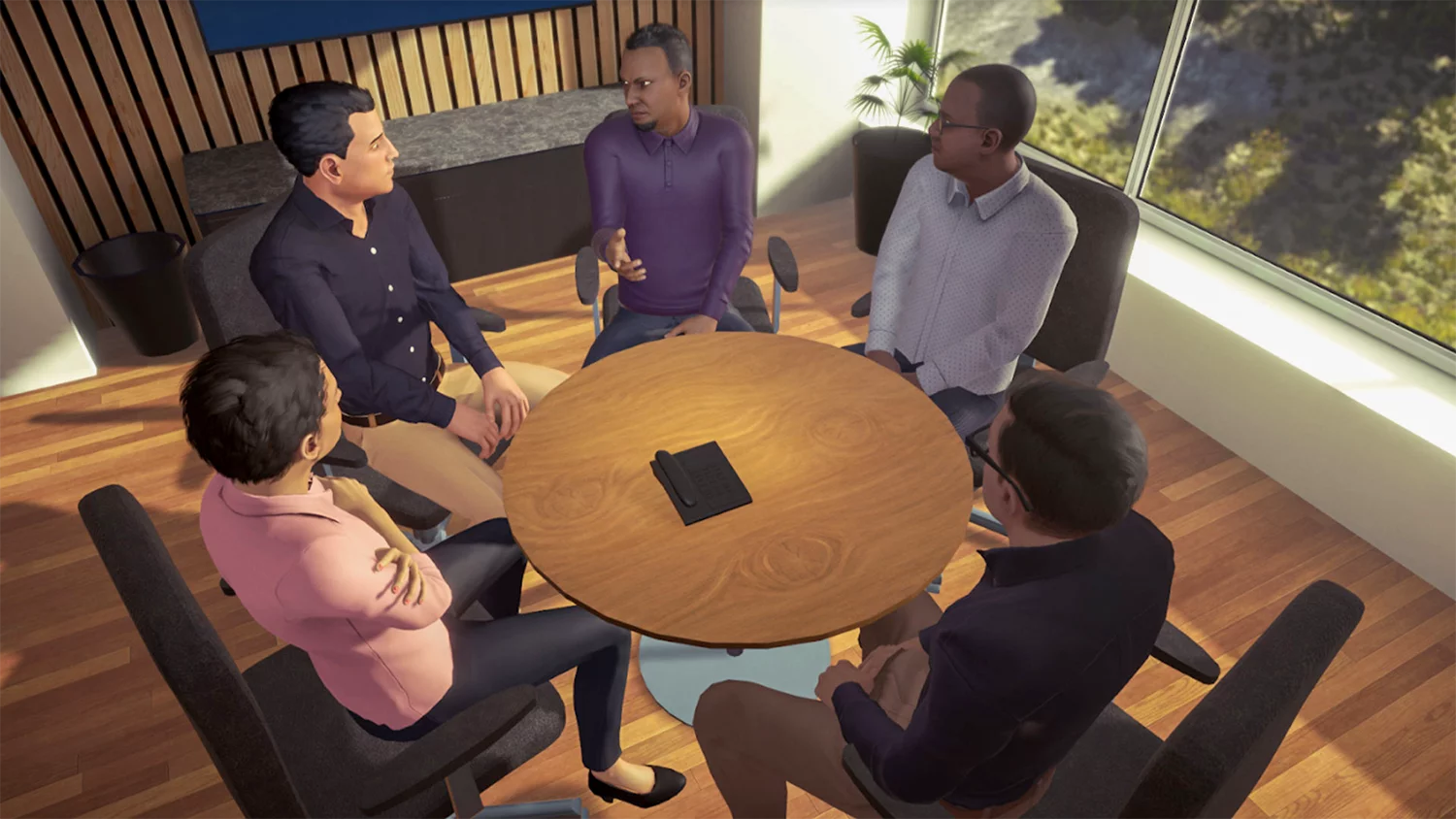Customer Story: Bodyswaps
- October 26, 2022

The Company
Bodyswaps is a pioneering, independent software vendor (ISV) specializing in soft skills VR training for companies and schools. They offer “off-the-shelf” VR apps designed to develop skills in public speaking, workplace communication, inclusive leadership, customer service, health, and social welfare.
The Problem
VR pilot programs won’t scale to full deployments without easy and effective VR device management. Companies are asking Bodyswaps (and other ISVs) to tell them how to manage VR devices, deploy content, and control the end-user VR experience. Bodyswaps also realized they needed a way to distribute VR content that works at scale because manually installing apps on each device will add friction to VR pilot programs.
The Solution
ArborXR gives organizations tools to manage VR headsets, deploy content, and control what users see and do in VR. In addition, ArborXR provides Bodyswaps and ISVs with secure, reliable, and remote app distribution. ISVs can upload as many app versions as they want without file size restrictions, connect developer tools, and auto-update apps as they are published. ISVs can grant (or revoke) access to any organization using ArborXR, sharing VR apps easily, so they are immediately available to deploy.
Customer Story Overview
The idea for Bodyswaps began when co-founder Chris Mallet saw the power of VR live in therapy:
An adult woman diagnosed with depression was placed in a VR environment and was presented with a crying twelve-year-old.
The instruction? Comfort the child.
After about a minute of doing this, the scene shifted, and the VR bodies “swapped.” Now, in VR, the adult was the child, and she was comforted by her own words.
Mallet watched as the woman began to cry, hearing empathetic words of comfort from herself back towards herself. The VR “body-swapping” experience gave the woman such a profound therapeutic experience that it had immediate and long-term effects on her symptoms and how she thought about herself and spoke to herself.
This was just one experience in a 4-week study that followed 15 patients:
“In an open trial, three repetitions of this scenario led to significant reductions in depression severity and self-criticism and a significant increase in self-compassion, from baseline to 4-week follow-up. Four patients showed clinically significant improvement,” Cambridge University reports.
‘Body swapping’ altered her perspective and taught her valuable tools to fight depression.
Bodyswaps is about self-discovery, self-reflection, and education by shifting a user’s perspective in VR. They offer VR training in companies and schools across North America and Europe to elevate employability and soft skills. But where did they get started? And what about VR helps shift a person’s perspective?

Mallet and his fellow co-founders immediately saw how powerful these kinds of self-reflective VR experiences could be when applied to soft skills development. Learners often need holistic instruction, including their body language, actions, and words. Bodyswaps uses VR as a medium to allow learners to see and hear themselves in life-like situations.
Bodyswaps Today
“Bodyswaps wants to level the playing fields for millions of people by reinventing the way we train soft skills– VR apps help us do that,” Mallet says.
Bodyswaps specializes in “off-the-shelf” and “autonomous” VR apps. Organizations can purchase VR apps, and students complete modules themselves without instructors.
Bodyswaps aims to help students improve their employability skills and soft skills for the workplace. In addition, they have developed innovative inclusion and diversity training that prepares trainees to recognize implicit bias and have healthy dialogue around issues of race and sexism.

Typically, coaching for body language and communication is far too expensive and out of reach of the average student. Their goal is to provide soft skill training in education and corporate environments that is accessible to anyone:
“We believe that everyone deserves a fair shot at life … For most, it’s too expensive to learn soft skills. Most students can’t hire a coach. So they have to learn online… Preparing for a job interview by reading a forum is like learning how to play tennis by watching a video… But VR brings everyone a whole new way of learning,” says Mallet.
Bodyswaps Overcoming Obstacles
Organizations starting VR pilot programs can manually download apps from app stores or plug devices into computers for a few headsets, but as soon as they begin to scale, this process doesn’t work.
With dozens or hundreds of headsets, app installation and updates will bottleneck at the admin level and it becomes even more difficult if organizations are spread across cities, states, or countries.
“The nature of the conversation over the past two years has changed dramatically. It went from, ‘Prove to me that VR is not a gimmick,” to, “I want to use VR. I want to use your software. How do I do it at scale?’” says Mallet.
Bodyswaps is working with companies and universities across the UK and the US, and organizations are asking for a better way to run VR pilot programs and distribute content. Education and enterprise organizations need a plan to manage devices and content at scale.
Mallet continues, “When working with 1-5 headsets, it’s easy to manage content. But once things scale, it becomes a mountain of a problem, a chasm you must bridge. ArborXR is the bridge we use to deploy content and manage devices.”
IT admins often turn to legacy device management (MDMs) systems to help distribute content and manage XR devices. Unfortunately, there are significant challenges in using legacy MDMs for VR devices. Legacy MDMs are built for phones and tablets, not VR/AR devices.
Without legacy MDMs to manage VR devices, organizations sometimes opt for manually installing apps and settings on devices.
For example, Bodyswaps has content on app stores (Pico, HTC, Meta). But in order to install or update apps, organizations need to turn on each device, sign into an app store, download apps and launch it to ensure it works correctly.
Without content on app stores, other ISVs must send apps via a filesharing platform or a physical USB drive and manually sideload apps on devices.
Whether an ISV is on an app store or not, IT admins need to gather every headset each time there is a new app update (or a new app is needed) to ensure devices have installed the latest versions of apps. Sometimes, this means shipping devices back and forth between departments across cities, states, or countries.
Manually managing devices increases friction for VR pilot programs.
“When you talk to one person who manages 5 headsets, they can do it all themselves. They aren’t afraid of plugging in a USB cable, sideloading, or a wifi issue. They’re fine with putting a device in developer mode and all the little things you must do to run a VR headset. But at some point, you’re going to have to be able to deploy at scale to fleets of headsets… And all the little things become a big problem,” says Mallet.
Bodyswaps began a partnership with ArborXR because they needed a tool for remote app distribution that works at scale for enterprise and education.

What Is Remote App Distribution?
Remote app distribution allows independent software vendors to upload their apps one time and share apps directly with organizations on ArborXR.
ArborXR’s remote app distribution allows ISVs like Bodyswaps to grant or revoke access to VR apps within the ArborXR web portal. Once an organization receives access to an app, it is immediately available to deploy to their headsets.
ArborXR Helping Bodyswaps and ISVs
Companies and schools often ask ISVs to manage VR headsets in addition to providing VR content. Managing fleets of VR headsets can become necessary to land new businesses. But we’ve also seen that if there isn’t a plan for scale, VR pilot programs fail.
This can include purchasing hardware, enrolling in device management software, configuring hardware settings, installing apps on VR headsets, and shipping to a company or school. Unfortunately, this additional support can be outside the scope of most ISVs’ expertise. It means ISVs have to provide technical support and device management in addition to content creation.
“We are the content. That’s what we do. But that’s not all that’s needed. Regardless of how brilliant your software is, I think ArborXR adds to a product because there is a need to scale. To easily deploy software easily, to see track VR apps being deployed, where the devices are at… it’s essential for this next stage of the industry,” says Mallet.
Regardless of whether an ISV must manage devices end-to-end, many organizations see ISVs as guides in planning a VR program.
ISVs play a key role in helping remove friction for their clients to make VR as accessible as possible. ArborXR helps ISV’s VR projects by giving tools to manage VR headsets or by assisting ISV clients with managing and deploying VR content.
Free Support for Up to 50 Devices
To remove as much friction as possible from VR pilot programs, we offer free support on up to 50 devices.
“Using ArborXR, we can give up to 50 free devices to our clients. It shows that you guys are here with us for the long game, the long term. We’re doing this because true success for VR will come the day it becomes a no-brainer for universities or companies to go from 50 headsets to 500 or to 5,000.”
Chris Mallet, CEO of Bodyswaps
Final Thoughts
Bodyswaps realized that in order for their VR apps to grow with enterprise and education, they needed a plan to scale. Organizations and ISVs need VR management tools that work seamlessly together, removing the friction between VR content creators and end-users.
The easier it is for education and enterprise to manage devices, deploy content and control the headset experience, the more likely a VR program is successful.
That’s Where We Can Help
ArborXR makes it easy to manage VR devices, deploy content, and control what users see and do in VR. ArborXR works with over 600 independent soft vendors (ISVs) who provide custom content or off-the-shelf VR apps like Bodyswaps. ArborXR empowers crucial features for commanding a fleet of XR headsets including managing XR devices, deploying content, and controlling what users see and do in VR.
Subscribe to stay in the know!
